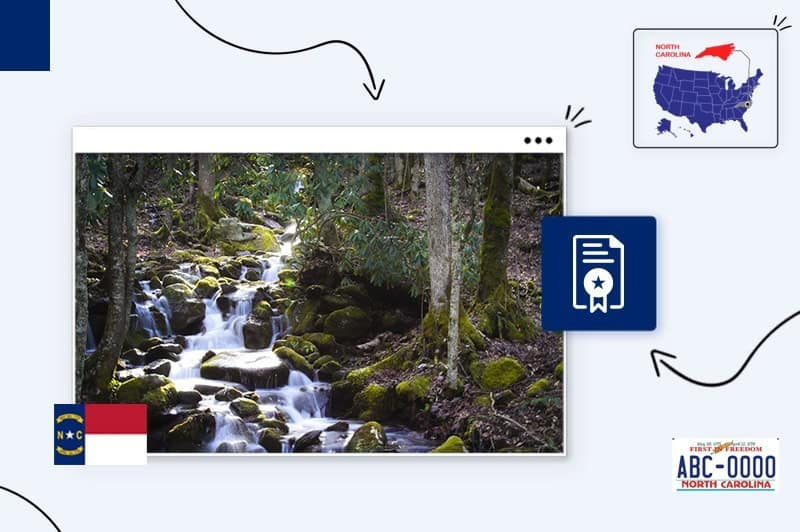
Home » How to Start a Small Business » Start a Business in North Carolina
Similar to the delicious Krispy Kreme doughnut (originating in Winston-Salem), certain ingredients make a state right for business.
Like a favorable tax climate, low living costs, an educated workforce, bustling cities, thriving urban areas, and high small business survival rates.
NC has those ingredients and more:
And recent WalletHub report ranks Durham 5th, Charlotte 8th, Raleigh 11th, and Winston Salem 13th in their “Top Spots to Start a Business.”
Ashley Cagle, Vice President at the Greater Raleigh Chamber of Commerce, said, “She isn’t surprised.”
Discover why and how to start a business in North Carolina in 11 easy steps.

James Clear (author of Atomic Habits) wrote, “Excitement is a better motivator than discipline.”
And he’s right. After all, who sticks at something they’re not interested in using discipline, not many! And unused gym memberships prove it!
But when you choose a business idea you’re passionate about, you’ll increase your odds of success because interest will motivate you to keep going when the going gets tough.
How to develop a business idea:
First, consider your interests, skills, available resources, and why you want to start a business in North Carolina.
Next, narrow your ideas by focusing on what suits and motivates you.
Once you have some ideas, ask yourself these questions:
And consider your community’s specific needs and interests because they are your target market.
Certain businesses thrive in NC, from sweet potatoes to soybeans, microprocessors, and craft beer.
Food and accommodation services, manufacturing (especially furniture), and healthcare are the biggest employers, but 934,604 small businesses also support the economy.
Here are some examples:
With an idea in mind, it’s time to test the water:
Now is when you put your idea through the wringer to ensure it’s worth your investment.
You’ll validate it during your business plan’s market research (coming up next) to get the answers to these crucial questions:

You would only drive across the country if you planned your route, right?
Your business plan is your start-up’s GPS, guiding you throughout your journey. There are several parts to a business plan; the most important are:
Your market research identifies your ideal customers, reviews your competitors, and determines if your niche is growing or declining.
But it’s also crucial for developing your marketing plan as it identifies where your target audience shop for your business idea, enabling you to create marketing strategies that engage and convert them into customers.
A marketing plan uses your market research to develop strategies proven to attract, engage, convert, and keep your target audience.
Successful businesses often use multiple brand strategies, like a website, social media, paid, and traditional advertising techniques. Your marketing plan tells you where to invest your advertising dollars for the best ROI.
The financial part of your business plan helps confirm your idea is viable and convinces lenders to invest; it includes 4 financial statements with analysis:
For investment reasons, add a 5th financial projections statement outlining how much revenue you expect in a specific period and how you’ll earn it.
Durham, Charlotte, Raleigh, and Winston-Salem rank high in the Top Spots to Start a Business, so they’re all excellent locations. But your choice also depends on your niche and target audience’s demographics.
Once you choose a location, check the area’s demographics to ensure your business idea suits the locals, and there aren’t too many direct competitors.
Zoning laws determine which businesses can operate in specific areas; even home-based must comply.
Counties and cities throughout NC set zoning laws, and you call your local building or municipal planning department to learn more about your location’s regulations.
And if you’re inclined to reading government papers, check out the NC zoning ordinance.
Is your business brick-and-mortar, online-only, or a mixture of both? Now is the time to decide because if you are online, you’ll need certain things to succeed, like:
Brick-and-mortar businesses should also create an online presence by registering a Google profile to promote their brand.

Branding, memorability, domain, and trademark availability are the 4 things you should consider when choosing your business name.
For example:
Next, you must meet NC’s business name requirements.
LLCs, LLPs, and corporations submit a business name while filing their formation application with the NC Secretary of State’s Office.
But there are some naming requirements:
You can reserve an available business name in North Carolina by filing an application to reserve a Business Entity Name.
A DBA (Doing Business As) allows you to trade using a name other than your own (handy for sole proprietorships and general partnerships) or your registered name for legal entities.
The term for DBA in NC is an assumed name, and you register one by filing a Certificate of Assumed Name.

A business structure describes the type of business entity you choose to start. Your choice determines your legal, tax, and financial liability obligations. There are many types of entities but some suit SMBs more than others.
Sole proprietorships, partnerships, LLCs, and S corporations suit small businesses because they use the pass-through tax system, which avoids corporation tax and passes all profits and losses to the owner/owners/members/ or shareholders.
The advantage is you avoid double taxation, instead paying income tax on your tax return at a rate relative to your earnings.

Using separate business banking, credit cards, and accounting helps simplify your bookkeeping duties.
And maintain liability protection for legal entities like LLCs and S corporations. Because if a legal entity mixes business and personal accounts, it can be found guilty of breaking the corporate veil, putting the owner’s assets at risk should they be sued.
To open a business bank account, you may need an EIN, which is one reason many sole proprietors and LLCs without employees get one.
Others are:
Your accountancy duties depend on your chosen entity and if you have employees.
However most start-ups need business accounting to track their debits and credits and simplify quarterly and annual tax filings.
You can use accounting software that integrates with your business banking and credit accounts to balance your books and an accountant to help fulfill your tax duties.

Your chosen business structure can determine how you’ll fund your start-up in North Carolina, for instance:
S corporations can raise capital by selling shares, and LLCs can get a small business loan, credit card, or overdraft.
However, sole proprietors and general partnerships often need alternative ways to raise funds to start and run their businesses.
Let’s look at your options:
Start-ups and existing businesses can apply for state grants and incentives to support their venture.
Incentives can include lower taxes and other start-up costs, whereas grants are interest-free cash injections you don’t repay.
Some NC resources:
The NC SBA branch supports small businesses, including SBA-backed loans with lower interest and longer repayment terms.
North Carolina Angel Investors: Find over 5000 NC angel investors seeking start-up investment opportunities.
When you start a business in North Carolina, you take on certain risks; one way to reduce them is by purchasing business insurance. Some insurance policies are optional; others are mandatory; here’s what you need to know.
Common types of business insurance:
NC employers must get 2 types of insurance.

The Tar Heel State doesn’t have a single business license that ensures you comply with state requirements in all jurisdictions.
However, it has 700 plus state-issued regulatory occupational licenses and permits!
Whether you need one or more depends on your business type, industry, what services and products you sell, and your location.
Check the North Carolina Economic Development Partnership’s Business Licenses & Permits for state licenses. For local licenses and permits, contact your local county clerk’s office.
Besides state tax, you’ll also have federal and local taxes to consider.

Hiring your team is an exciting time. After all, these are the people who’ll help grow your business.
When hiring, you must comply with certain requirements at North Carolina and federal levels, such as:
But there’s more to finding your team than registration, reporting, and insurance. You need the right people for the job.
Lionel Messi (the world’s greatest soccer player) just joined Inter Miami.
The question is, why?
Saudi Arabia offered him 1.5 billion dollars, and Europe is home to the Champions League.
It could be because David Beckham is 10 years building his team, with an end goal of making MSL a leading soccer league. And knows he needs the right players to make it happen.
Messi is that player. And Beckham did whatever was necessary to get him.
What’s this got to do with you?
Who you surround yourself with can make or break your business, from shopfront employees, product developers, and experienced accountants to fellow business owners providing start-up tips.
Attracting the right people to your team (like Messi) is key.
To help you, the NC Department of Health and Human Services provides a Job Candidate Trial Period business incentive.
North Carolina payroll regulations exist to ensure employers pay employees a fair and regular wage. In NC, they include:
Once you have your team, you can use a payroll service to track hours, issue paychecks, and organize your bookkeeping for tax season.
My son’s school has a great motto – “If you want to go fast, go alone. If you want to go far, go together.”
And even if you are a one-person-show, you don’t have to operate alone because you can hire contractors for specific tasks, like an accountant on retainer for tax season or a freelance writer for your blog posts.
When hiring contractors, you must classify them correctly to avoid breaking NC employment laws.

In 2012, a small subscription-based razor company “Dollar Shave Club” launched a humorous marketing campaign that revolutionized the shaving industry.
Their innovative approach of a “dollar a month razor subscription delivered to your door” was so disruptive it gained one 3rd of all US razor sales and a $1 billion buyout by Unilever.
Here’s how that can help you.
CEOs Mike and Mark had little cash, got some investment from a start-up incubator, and (here’s the point) used it to show their target audience how their affordable, high-quality product and service met all their needs.
I love this example because it shows how small businesses can beat corporations by knowing their target audience and giving them what they want.
Check out their “Our Blades Are F***ing Great” video; it’s hilarious.
Here are some ways you could become the next Dollar Shave Club.
Some strategies play the long game; email marketing is the marathon of marketing and, when done right, the most profitable.
Opt-in mailing lists/newsletters allow readers to provide their email addresses for whatever you offer, like a free mini course or ebook.
It’s a strategy you employ once you’ve built your website and your marketing plan is in place.
Special offers are great for attracting potential customers and enticing them to take action, such as saving money or enjoying extra benefits.
Some strategies you could use to land your first sales include:
Go Pro sells cameras and Red Bull energy drinks, but together they create a world-leading lifestyle brand.
Okay, that’s high brand collaboration, but it works locally too.
Look for businesses in your marketplace (non-direct competitors) whose reputation and style suit yours and whose customer base is beyond your target audience.
For example, a local bakery specializing in artisanal pastries could collaborate with a coffee shop known for its premium coffee blends and cross-promote to enhance their customer experience and benefit from each other’s customer base.
Have you ever told a friend about an extraordinary meal or outstanding service?
If so, that’s word-of-mouth marketing. And it’s the most powerful influencer because people believe what close friends and family recommend.
You encourage it by being better than your competitors at every opportunity and asking your customers to spread the word.
Speaking of which:
Customer reviews are vital for influencing people to choose your brand over your competitors.
You get them the same way as word-of-mouth marketing, by providing excellent products and outstanding service. And once you do, you must pay attention to them to ensure your business fulfills your target audience’s needs.
Always ask the customers to leave reviews on your website, Google My Business page, and any other industry-relevant review sites.
People need to see a brand around 8 to 10 times before they’ll trust it enough to use it; that’s why you use brand marketing.
But another way to gain trust is by providing helpful content that shows people you are an authority in your niche and want to help your ideal clients solve their problems.
You can write or record your content; the key is putting it where your target audience will see it, such as using a website blog, social media platforms like TikTok or Instagram, and YouTube.
A small business launch event is your chance to make a grand entrance into the business world.
It’s your opportunity to showcase your products, services, and brand to potential customers, partners, and your local community through presentations that captivate your audience.
Your launch event’s aim is to generate excitement, create brand awareness, and build relationships that fuel your start-up’s future growth and success.
And that’s how to start a business in North Carolina in 11 easy steps.
Remember to comply with NC`s business regulations, get the right permits and licenses, choose an appropriate business name and location, and use our tips to promote your start-up.
And if you need more help, check out our post “How to start a small business in 2024” and the below FAQs.
Good luck.
North Carolina has no state-level general business license, so no associated fees exist. However, you may still need a state-level occupational license or a municipal-level license or permit to operate your business.
North Carolina recently earned top rankings as the best state to start a new business, which tells you what you need to know!
To file Articles of Organization for an LLC in North Carolina, submit the formation documents (along with the $125 filing fee) to the Secretary of State, either online, by mail, or in person.
Banks vary on their requirements but most will ask you for the following:
Yep, in North Carolina, any individual 18 years or older with a physical address within the state can serve as a registered agent for a business.
This portion of our website is for informational purposes only. Tailor Brands is not a law firm, and none of the information on this website constitutes or is intended to convey legal advice. All statements, opinions, recommendations, and conclusions are solely the expression of the author and provided on an as-is basis. Accordingly, Tailor Brands is not responsible for the information and/or its accuracy or completeness.
Products
Resources
©2025 Copyright Tailor Brands